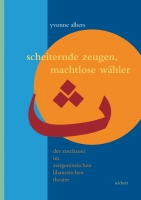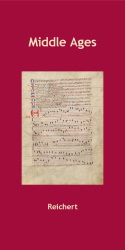Search
Albers , Yvonne
Scheiternde Zeugen, machtlose Wähler
Der Zuschauer im zeitgenössischen libanesischen Theater
2011
17.0 x 24.0 cm, 118 p., hardback
ISBN: 9783895008030
17.0 x 24.0 cm, 118 p., hardback
49,00 €
ISBN: 9783895008030
Short Description
The study provides new insights into the development of contemporary theatre in Lebanon. Focusing on selected stage works by Rabih Mroué (b. 1967) and Hisham Jaber (b. 1980), the author presents a thorough analysis which draws on current theoretical approaches. She is thereby able to furnish an illuminating definition of the politics of this theatre: although still concerned with critically reflecting on the civil war and a society fragmented by inner conflict, its real political substance is to be found in its form of representation rather than specific content. Mroué and Jaber challenge the self-reflection and participation of the critical individual by placing the audience at the centre of their attention. By adopting the very same innovative perspective on the audience, the study also succeeds in linking it to recent trends in international theatre.Description
No english description available. Showing german description„Der Zuschauer“, so lautete jüngst eine Einschätzung des bekannten Theaterwissenschaftlers Hans-Thies Lehmann, „ist praktisch, mehr aber noch ästhetisch die zentrale Frage des Theaters, seiner Praxis und seiner Theorie geworden“. In dieser Kunstform, die sich wie keine andere durch eine Gleichzeitigkeit von künstlerischer Produktion und Rezeption definiert, regt die Frage nach der Rolle des Publikums derzeit weltweit Künstler zur kritischen Auseinandersetzung an.
Im soziokulturellen Kontext des Libanon, so die zentrale These dieses Buches, erhält die „Zuschauerfrage“ jedoch eine ganz spezifische Qualität: Über sie können Wahrnehmungsprozesse nicht nur im Theater, sondern vor allem innerhalb der eigenen politischen Gemeinschaft und der Mangel an zivilgesellschaftlicher Partizipation thematisiert werden. Der Blick auf den Theaterzuschauer weist somit über den Rahmen des Theaterraums hinaus: Er verweist auf den Zuschauer als Bürger.
Das vorliegende Buch widmet sich experimentellen Ansätzen der zeitgenössischen libanesischen Theater- und Performanceszene, die das Selbstverständnis des Zuschauers und die Tätigkeit des „Zuschauens“ zur Disposition stellen. Als paradigmatische Beispiele wurden Bühnenarbeiten von Rabih Mroué (geb. 1967) und Hisham Jaber (geb. 1980) ausgewählt, in welchen die etablierte Position des Publikums durch innovative künstlerische Mittel in Zweifel gezogen wird. Im Rahmen der theaterwissenschaftlichen Analyse wird deutlich, dass in Mroués „LOOKING FOR A MISSING EMPLOYEE“ (2003) und Jabers „NOT FOR PUBLIC“ (2008) das klassische Verständnis des Theaterzuschauers - als eines passiven Konsumenten der theatralen Handlung - angegriffen und neu verhandelt wird. Hierüber werden gleichsam spezifische Problematiken der libanesischen Nachkriegsgesellschaft berührt und die Stellung des Individuums in einem Staat zur Diskussion gestellt, der sich de jure als demokratische Nation ausweist, de facto jedoch auch zwanzig Jahre nach dem Bürgerkrieg noch immer von Konfessionalismus, Klientelismus, Clanwirtschaft und Korruption geprägt und gelenkt wird.
Die beiden in ihren ästhetischen Strategien sehr unterschiedlichen Arbeiten zeigen hierin einen hohen politischen Gehalt. Dieser lässt sich - auch wenn Mroué und Jaber sich thematisch stark mit der eigenen Gesellschaft und Geschichte auseinandersetzen - jedoch weniger im verhandelten Inhalt als in der politischen „Gemachtheit“ dieser Theateransätze erkennen, d.h. in der Fokussierung auf und Auseinandersetzung mit dem Zuschauer. Hierin findet sich ein zeitgenössisches Neuverständnis politischen Theaters, mit dem diese Künstler eine kritische Distanz zu ihren Vorreitern, den libanesischen Vertretern der arabischen Theateravantgarde, einnehmen. Das Buch versteht sich somit als Beitrag zu einer noch größtenteils ausstehenden Forschung über die Entwicklung des zeitgenössischen libanesischen bzw. arabischen Theaters, seinen gegenwärtigen Fragestellungen und seiner Ästhetik.
Biographical Note
Yvonne Albers, M. A., studied Arabic Studies, Theatre Studies, and Philosophy between 2003 and 2010 at the Universities of Leipzig and Damascus. She completed her masters with a thesis on the role and importance of the spectator in contemporary Lebanese theatre and performance arts. This work included an extensive field research period in Beirut. Between 2007 and 2010 she held a scholarship of the Heinrich Böll Foundation. During this time, directed by Muhanad al-Hadi and funded by the Goethe Institute Iraq, she was also a member of an Iraqi-German theatre company who performed at theatres and festivals in Syria, Tunisia, and Jordan. During her studies, Yvonne Albers also worked for several years at the Simon Dubnow Institute for Jewish History and Culture at Leipzig University in various research fields: Amongst her work was a research project on Arab receptions of the Holocaust and a project writing and publishing an “Encyclopedia of Jewish Cultures” of several volumes.Since July 2010, she has been working as a research assistant at the department for Arabic Studies/Center for Middle Eastern Studies at Marburg University (Germany). Her current research focuses on conceptions of public sphere and space in the Arab cultural history and their reflection in contemporary arts.




 Preface
Preface

 Neuerscheinungen 2023/2024
Neuerscheinungen 2023/2024
 Gesamtverzeichnis 2023/2024
Gesamtverzeichnis 2023/2024
 Katalog Oriental Studies & Linguistics
Katalog Oriental Studies & Linguistics
 Mittelalter
Mittelalter
 Deutsche Inschriften
Deutsche Inschriften
 Musiktherapie
Musiktherapie
 Literaturen im Kontext
Literaturen im Kontext